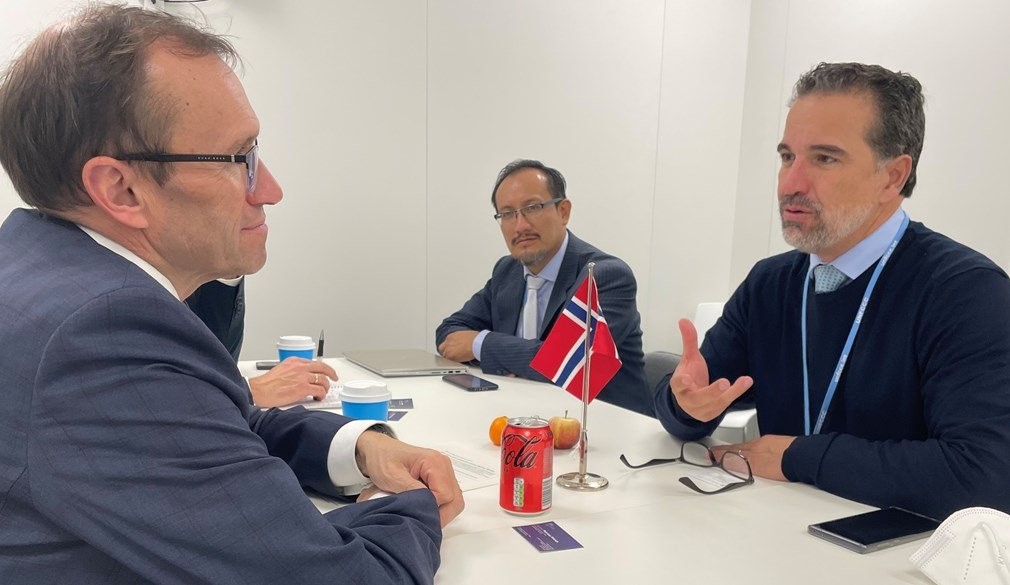
Ministers Gustavo Manrique Miranda from Ecuador and Espen Barth Eide from Norway at the climate summit in Glasgow announced an expansion of the Norwegian support to Ecuador’s efforts to address deforestation through REDD+.
The USD 24 million – equal to NOK 200 million – contribution from Norway will pay Ecuador for verified reductions in emissions from deforestation achieved in 2020 and 2021. Ecuador has already received USD 31,4 million from Norway and Germany after reducing deforestation between 2015-2018, channelled through the German Development Bank KfW’s initiative “REDD Early Movers”.
“The conservation of the terrestrial and marine ecosystems of our territory is a priority for Ecuador. We are sure that in the face of the current and future climate crisis of the planet, the new currency of exchange will not be the Bitcoin but it will be biodiversity, and in that we have much to contribute. With the great support of Norway we have made important achievements in reducing deforestation and conserving our biodiversity. On behalf of the Ecuadorian government I thank Norway and Germany for its great commitment to the conservation of our forests, the benefit of which is not only for Ecuador but for the whole world”, said Gustavo Manrique, Ecuador’s Minister of Environment, Water and Ecological Transition.
Collaboration with the LEAF coalition
Deforestation in Ecuador has seen a downward trend over the last ten years.
“Ecuador has been a pioneer in efforts to reduce deforestation in ways that benefit indigenous peoples and local communities. Norway is committed to supporting countries that successfully reduce deforestation. We are delighted to continue our partnership with Ecuador, and excited that they are among the first countries to enter into a Letter of Intent with the LEAF coalition, said Espen Barth Eide, Norway’s Minister of Climate and Environment.”
Ecuador will also be looking to seek financing for future emission reductions for reduced deforestation to the LEAF-coalition – a coalition of some of the world’s largest companies and the governments of Norway, the United Kingdom and the United States. The LEAF Coalition launched at President Biden’s Climate Summit in April, promising to mobilize an initial USD 1 billion this year to pay tropical forest countries that reduce deforestation in the period 2022-26. On 2 November it announced it had met that goal.
On Wednesday, November 5, Minister Manrique Miranda signed a Letter of Intent with LEAF in Glasgow, making Ecuador among the first in line to qualify for financing from LEAF.
“We are keen to support Ecuador in the efforts to access more climate finance, including from the private sector. Paying Ecuador for results in 2020 and 2021 will have a double effect. Not only will it reward Ecuador for current performance, the payments will be spent on efforts that can trigger even better future results under LEAF”, says Espen Barth Eide.
Payments from Norway will be certified by the third-party standard Architecture for REDD+ Transactions (ART). Norway guarantees a 10 USD floor price per ton of reduced emissions certified by ART.
Benefits reach indigenous peoples
Under the ongoing REDD Early Movers program financed by Germany and Norway Ecuador has pioneered efforts to support indigenous peoples and local communities. A part of the funding has been allocated to Ecuador’s renowned Socio Bosque programme. Socio Bosque offers economic incentives to indigenous peoples and local communities that conserve the rainforest. The partnership has led to 440 km2 of tropical forests being included in Socio Bosque, with an additional 2,460 km2 underway.
